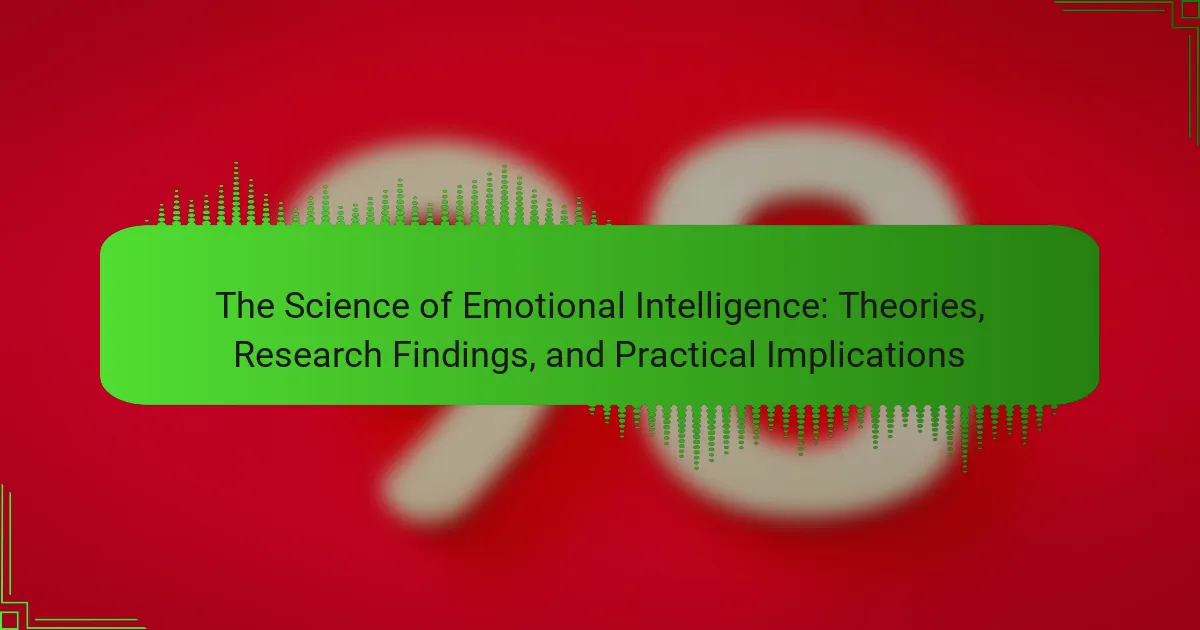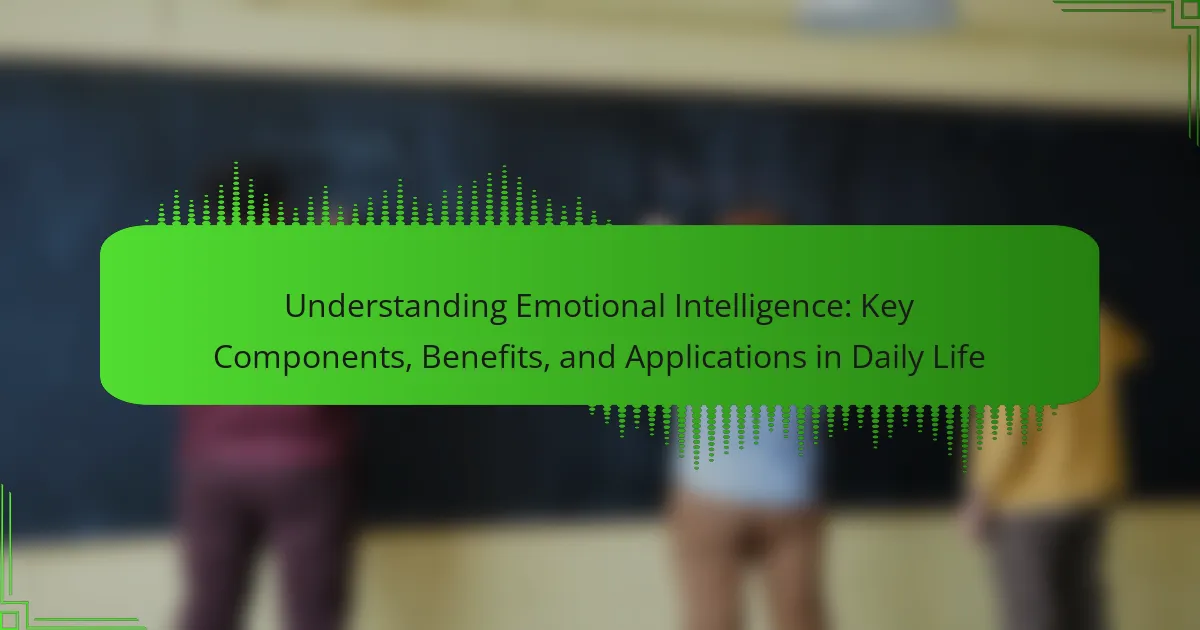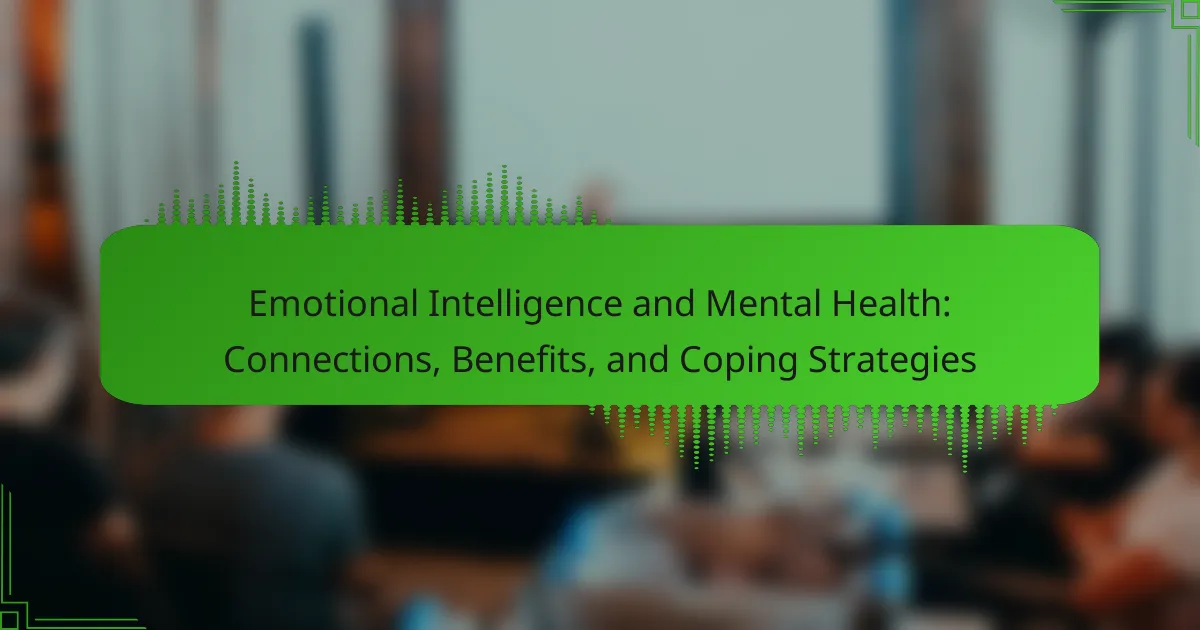Emotional intelligence (EI) is the ability to recognize, understand, and manage emotions in oneself and others, significantly impacting workplace performance. This article explores the role of EI in enhancing communication, collaboration, leadership, and conflict resolution among employees. Key skills associated with EI include self-awareness, self-regulation, motivation, empathy, and social skills, all of which contribute to improved job satisfaction and productivity. Additionally, various training programs, such as those offered by the Yale Center for Emotional Intelligence and the Emotional Intelligence Training Company, are highlighted for their effectiveness in developing EI skills. The article presents evidence on how EI training can lead to better workplace dynamics and performance outcomes.
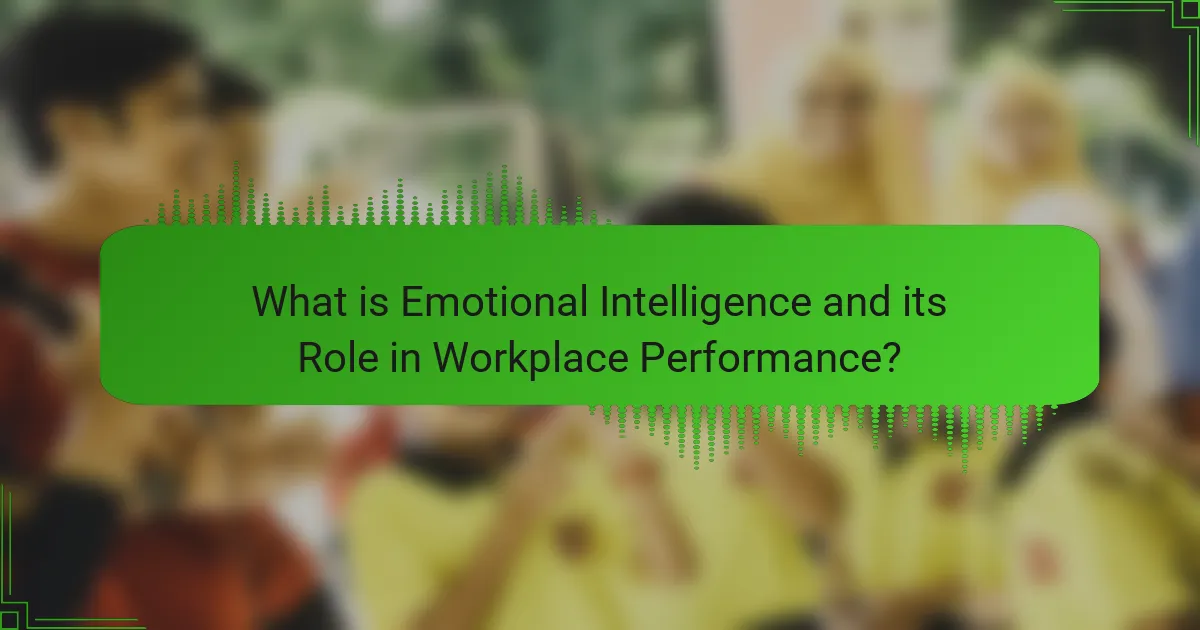
What is Emotional Intelligence and its Role in Workplace Performance?
Emotional intelligence (EI) is the ability to recognize, understand, and manage one’s own emotions and the emotions of others. EI plays a crucial role in workplace performance by enhancing communication and collaboration among team members. Employees with high emotional intelligence can navigate social complexities effectively. They demonstrate better leadership skills and conflict resolution abilities. Research indicates that organizations with emotionally intelligent employees experience higher job satisfaction and productivity. A study by TalentSmart found that EI accounts for 58% of job performance across various industries. This underscores the importance of emotional intelligence in achieving organizational success.
How does Emotional Intelligence impact employee engagement?
Emotional Intelligence (EI) significantly impacts employee engagement. High EI in individuals fosters better communication and collaboration. Employees with strong EI can manage their emotions and understand others’ feelings. This leads to a positive work environment. Engaged employees are more productive and motivated. According to a study by the TalentSmart, 90% of top performers have high EI. This correlation shows that EI directly influences engagement levels. Organizations with high EI cultures report lower turnover rates and increased job satisfaction. Thus, enhancing EI can lead to improved employee engagement outcomes.
What specific skills are associated with Emotional Intelligence?
The specific skills associated with Emotional Intelligence include self-awareness, self-regulation, motivation, empathy, and social skills. Self-awareness allows individuals to recognize their emotions and understand their impact. Self-regulation involves managing emotions and maintaining control in various situations. Motivation drives individuals to achieve goals and maintain a positive attitude. Empathy enables understanding others’ feelings and perspectives. Social skills facilitate effective communication and relationship management. Research by Goleman (1995) highlights these skills as essential for personal and professional success.
How does Emotional Intelligence influence team dynamics?
Emotional Intelligence (EI) significantly influences team dynamics by enhancing communication and collaboration. Teams with high EI members exhibit better conflict resolution skills. They can empathize with each other’s feelings, leading to stronger interpersonal relationships. This empathy fosters trust, which is crucial for effective teamwork. Research indicates that teams with higher EI perform better and are more cohesive. A study by Dr. Vanessa Druskat and Dr. Steven Wolff found that emotionally intelligent teams outperformed their counterparts in various tasks. This performance boost is linked to improved morale and reduced stress levels within the team. Therefore, EI is essential for creating a positive and productive team environment.
Why is Emotional Intelligence essential for leadership?
Emotional Intelligence is essential for leadership because it enables leaders to understand and manage their own emotions and those of others. This skill fosters effective communication, conflict resolution, and team collaboration. Leaders with high emotional intelligence can inspire and motivate their teams. They are better at recognizing the emotional needs of their employees. Research indicates that organizations with emotionally intelligent leaders experience higher employee satisfaction and productivity. A study by Goleman et al. found that emotional intelligence can account for up to 67% of the competencies that distinguish outstanding leaders. Therefore, emotional intelligence directly contributes to effective leadership and organizational success.
What traits define emotionally intelligent leaders?
Emotionally intelligent leaders exhibit several key traits. They possess self-awareness, allowing them to recognize their own emotions and their impact on others. They demonstrate empathy, which helps them understand the feelings and perspectives of their team members. Effective communication is another trait, enabling them to convey ideas clearly and listen actively. Emotionally intelligent leaders also show emotional regulation, managing their emotions in stressful situations. They are skilled in conflict resolution, addressing issues constructively. Additionally, they inspire motivation, fostering a positive work environment. Research indicates that emotionally intelligent leaders contribute to higher employee satisfaction and improved team performance.
How can leaders leverage Emotional Intelligence to improve performance?
Leaders can leverage Emotional Intelligence (EI) to improve performance by enhancing their interpersonal skills. High EI enables leaders to understand and manage their own emotions and those of their team members. This understanding fosters better communication and collaboration within teams. Research indicates that organizations with emotionally intelligent leaders experience higher employee engagement and productivity. A study by TalentSmart found that EI accounts for 58% of job performance across various industries. By recognizing emotional cues, leaders can address conflicts swiftly and effectively, leading to a more harmonious work environment. Additionally, EI training programs can equip leaders with techniques to motivate and inspire their teams. This ultimately results in improved overall performance and organizational success.
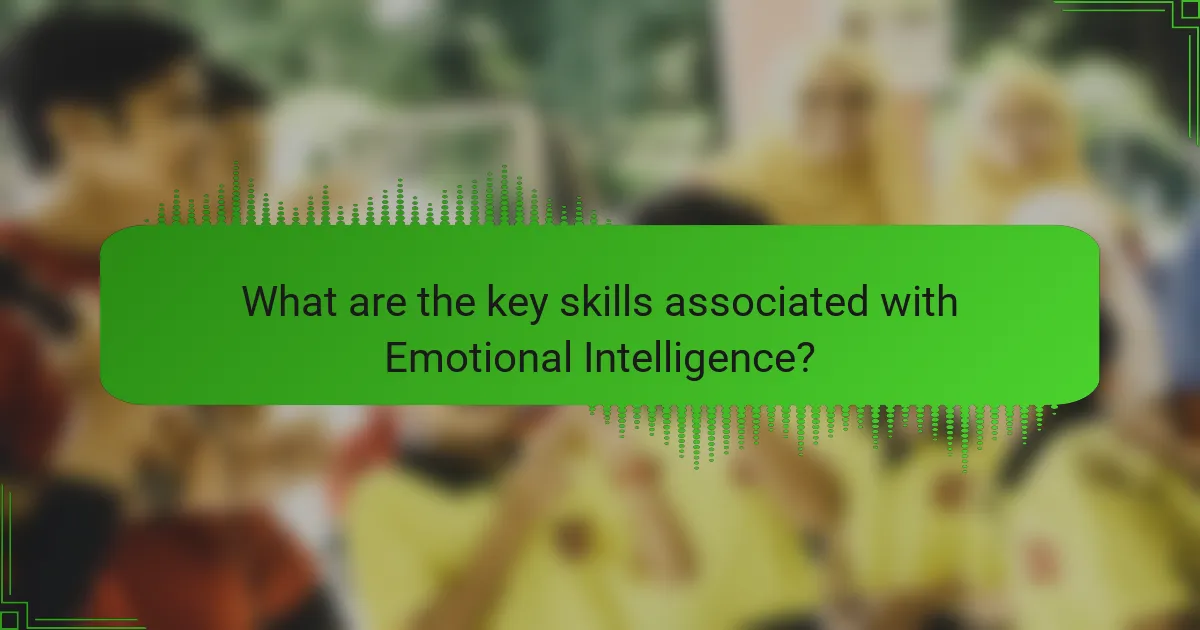
What are the key skills associated with Emotional Intelligence?
The key skills associated with Emotional Intelligence include self-awareness, self-regulation, motivation, empathy, and social skills. Self-awareness allows individuals to recognize their emotions and understand how they affect their behavior. Self-regulation involves managing one’s emotions and impulses effectively. Motivation refers to the drive to achieve goals for personal reasons beyond external rewards. Empathy is the ability to understand and share the feelings of others. Social skills encompass the ability to build relationships, communicate effectively, and work well in teams. These skills collectively contribute to improved workplace performance and interpersonal relationships.
How can individuals develop their Emotional Intelligence skills?
Individuals can develop their Emotional Intelligence skills through self-awareness, self-regulation, motivation, empathy, and social skills. Self-awareness involves recognizing one’s emotions and their impact on thoughts and behavior. Practicing mindfulness can enhance self-awareness by promoting reflection on emotional responses. Self-regulation includes managing emotions and impulses effectively. Techniques such as deep breathing and cognitive reframing can assist in this area.
Motivation refers to the drive to pursue goals with energy and persistence. Setting personal goals and tracking progress can foster motivation. Empathy is the ability to understand others’ emotions. Engaging in active listening and perspective-taking can enhance empathetic skills. Social skills encompass the ability to build relationships and communicate effectively. Participating in group activities and seeking feedback can improve social interactions.
Research indicates that Emotional Intelligence training can lead to better workplace performance. A study by Cherniss et al. (2000) found that organizations with Emotional Intelligence programs saw improvements in employee satisfaction and productivity.
What are the best practices for enhancing self-awareness?
Engaging in regular self-reflection is a best practice for enhancing self-awareness. This involves setting aside time to think about personal experiences and emotions. Journaling can facilitate this process by documenting thoughts and feelings. Seeking feedback from others is another effective method. Constructive criticism can highlight blind spots in self-perception. Mindfulness practices, such as meditation, promote present-moment awareness. They help individuals observe their thoughts without judgment. Participating in personality assessments can provide insights into behavioral tendencies. Tools like the Myers-Briggs Type Indicator (MBTI) are commonly used. Finally, setting personal goals encourages self-evaluation. Tracking progress towards these goals fosters a deeper understanding of oneself.
How can empathy be cultivated in the workplace?
Empathy can be cultivated in the workplace through active listening and open communication. Active listening involves fully concentrating on the speaker, understanding their message, and responding thoughtfully. This practice fosters a supportive environment. Open communication encourages team members to share thoughts and feelings without fear of judgment.
Training programs focused on emotional intelligence can enhance empathy skills. Workshops that include role-playing scenarios help employees practice empathetic responses. Regular feedback sessions can also reinforce empathetic behaviors among team members.
Research indicates that workplaces with high empathy levels see increased employee satisfaction and productivity. A study by the Center for Creative Leadership found that leaders who demonstrate empathy are more effective in their roles. This evidence supports the importance of cultivating empathy in professional settings.
What role does communication play in Emotional Intelligence?
Communication is essential in Emotional Intelligence as it facilitates understanding and expression of emotions. Effective communication allows individuals to articulate their feelings clearly. It also enables active listening, which is crucial for empathy. Empathy helps in recognizing others’ emotions and responding appropriately. Nonverbal cues, such as body language and tone, enhance emotional awareness. Research shows that individuals with high emotional intelligence excel in interpersonal communication. This leads to better teamwork and conflict resolution. Thus, communication serves as a bridge in applying emotional intelligence in various contexts.
How can effective communication enhance workplace relationships?
Effective communication enhances workplace relationships by fostering trust and collaboration. Clear communication reduces misunderstandings among team members. It encourages open dialogue, allowing employees to express their ideas and concerns. This openness leads to stronger interpersonal connections. Additionally, effective communication promotes a positive work environment. Employees feel valued when their input is acknowledged. Research shows that organizations with strong communication practices have 47% higher employee engagement. Enhanced relationships contribute to improved team performance and productivity.
What techniques improve active listening skills?
Techniques that improve active listening skills include maintaining eye contact, nodding, and summarizing. Eye contact shows engagement and encourages the speaker. Nodding indicates understanding and prompts the speaker to continue. Summarizing what the speaker has said confirms comprehension and clarifies any misunderstandings. Additionally, asking open-ended questions fosters deeper conversation. Providing feedback through verbal affirmations enhances the listening experience. Practicing mindfulness helps listeners remain present and focused. These techniques collectively enhance communication and foster better workplace relationships.
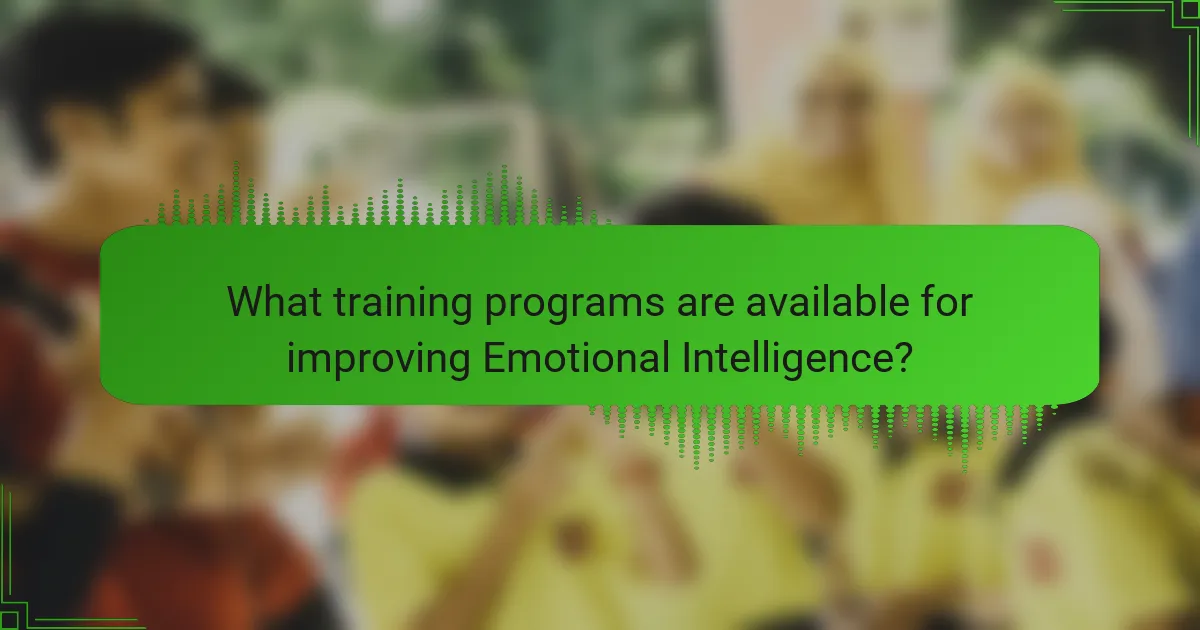
What training programs are available for improving Emotional Intelligence?
Numerous training programs exist to improve Emotional Intelligence (EI). Programs include workshops, online courses, and coaching sessions. The Yale Center for Emotional Intelligence offers courses focused on developing EI skills in professional settings. The Emotional Intelligence Training Company provides tailored workshops for organizations. Additionally, the Six Seconds Emotional Intelligence Network offers certification programs for individuals and organizations. Research shows that EI training can enhance workplace performance and interpersonal relationships. Programs often utilize assessments to measure EI before and after training, demonstrating effectiveness in skill improvement.
How do different training methods impact skill acquisition?
Different training methods significantly impact skill acquisition by influencing how effectively individuals learn and apply new skills. For instance, hands-on training methods, such as simulations, enhance practical skill application. According to a study by Salas et al. (2012), experiential learning leads to better retention of skills compared to traditional lecture-based methods. Additionally, collaborative training approaches, like group workshops, foster peer learning and improve communication skills. Research indicates that social learning environments can increase engagement and motivation, which are crucial for skill acquisition. Overall, the choice of training method directly affects the speed and effectiveness of learning new skills in the workplace.
What are the benefits of workshops versus online courses?
Workshops provide hands-on experience, while online courses offer flexibility. Workshops encourage real-time interaction and immediate feedback. This interaction fosters deeper engagement and networking opportunities. Participants can practice skills in a supportive environment. Studies show that experiential learning increases retention rates by up to 75%. Online courses allow learners to study at their own pace. This flexibility accommodates diverse schedules and learning styles. Research indicates that self-paced learning can enhance knowledge retention by 20%. Each format has distinct advantages based on learning preferences and objectives.
How can coaching enhance Emotional Intelligence development?
Coaching can enhance Emotional Intelligence development by providing personalized feedback and guidance. This process helps individuals identify their emotional triggers and responses. Coaches encourage self-reflection, enabling clients to understand their emotions better. They also teach skills for managing emotions in various situations. Furthermore, coaching fosters empathy by promoting active listening and understanding others’ perspectives. Research shows that individuals who receive coaching often report increased self-awareness and improved interpersonal skills. A study by Grant et al. (2009) found that coaching significantly enhances emotional awareness and regulation. This evidence supports the effectiveness of coaching in developing Emotional Intelligence.
What are some successful case studies of Emotional Intelligence training?
One successful case study of Emotional Intelligence training is the one conducted at the telecommunications company AT&T. The company implemented a program focusing on developing emotional intelligence skills among its managers. This initiative resulted in a 10% increase in employee engagement scores. Another notable case is the training program at the American Express Global Business Travel. Their emotional intelligence training led to a 20% increase in customer satisfaction ratings. Additionally, a study by the University of Pennsylvania found that organizations that implemented emotional intelligence training saw a 25% improvement in team collaboration. These examples demonstrate the positive impact of emotional intelligence training on workplace performance.
What outcomes were observed in organizations that implemented training?
Organizations that implemented training observed improved employee performance. Enhanced skills led to increased productivity and efficiency. Employees reported higher job satisfaction after training programs. Team collaboration also improved significantly. Training often reduced turnover rates within organizations. Financial performance metrics showed positive trends post-training implementation. Research indicates that organizations with training programs experience better employee engagement. A study by the Association for Talent Development found that companies investing in training have 218% higher income per employee.
How did specific companies integrate Emotional Intelligence into their culture?
Companies integrated Emotional Intelligence (EI) into their culture through targeted training and leadership development programs. For instance, Google implemented EI training to enhance team collaboration and communication. This training focused on self-awareness and empathy, fostering a supportive work environment. Additionally, Salesforce established a program called “Ohana” which emphasizes family-like support among employees, encouraging emotional connections.
Furthermore, Johnson & Johnson incorporated EI into their leadership development, emphasizing the importance of emotional awareness in decision-making. This approach led to improved employee engagement and retention. A study by TalentSmart found that 90% of top performers possess high EI, reinforcing the effectiveness of these initiatives.
These examples illustrate how integrating EI can enhance workplace culture and performance.
What practical tips can enhance Emotional Intelligence in the workplace?
Practicing active listening enhances Emotional Intelligence in the workplace. It involves fully concentrating on the speaker, understanding their message, and responding thoughtfully. This fosters better communication and strengthens relationships among colleagues.
Developing empathy is another practical tip. Empathy allows individuals to understand and share the feelings of others. Research shows that high levels of empathy lead to improved teamwork and collaboration.
Regular self-reflection is crucial. Taking time to assess one’s own emotions and reactions helps identify areas for improvement. Studies indicate that self-aware individuals tend to manage their emotions more effectively.
Providing constructive feedback enhances Emotional Intelligence. Giving specific, actionable suggestions helps others grow while maintaining a positive atmosphere. Positive feedback encourages open communication and trust.
Engaging in team-building activities can also boost Emotional Intelligence. These activities promote interaction and understanding among team members. Research demonstrates that teams with high Emotional Intelligence perform better and have lower turnover rates.
Lastly, seeking feedback from peers can enhance Emotional Intelligence. Understanding how others perceive one’s emotional responses helps in personal development. Studies suggest that individuals who actively seek feedback are more likely to improve their Emotional Intelligence skills.
Emotional intelligence (EI) is the ability to recognize and manage emotions, significantly impacting workplace performance. This article explores the role of EI in enhancing communication, collaboration, and leadership within organizations, highlighting specific skills such as self-awareness, empathy, and social skills. It also examines effective training programs and successful case studies that demonstrate the positive outcomes of integrating EI into workplace culture. Key insights reveal how developing EI can lead to improved employee engagement, job satisfaction, and overall organizational success.

